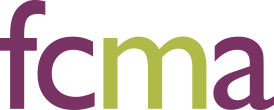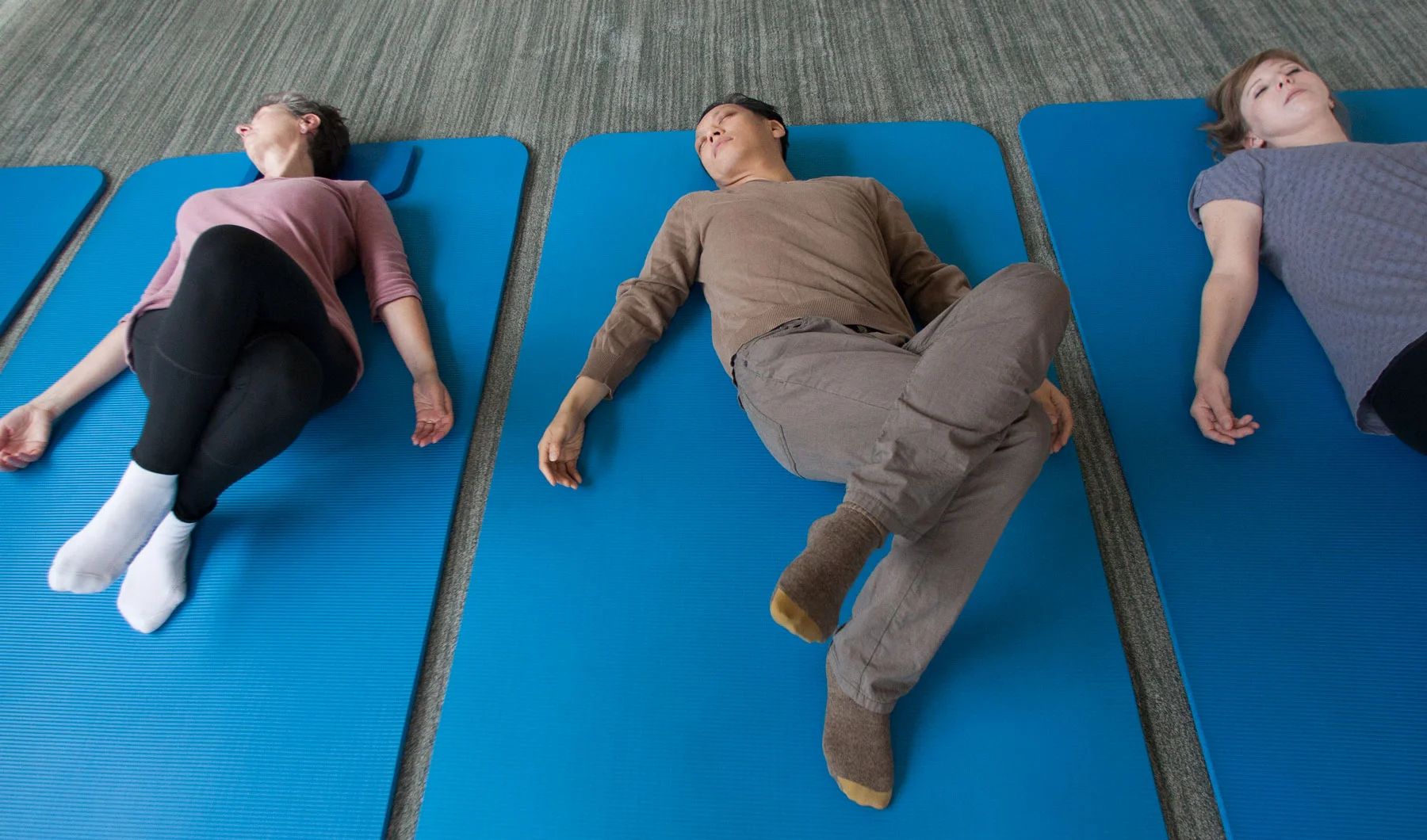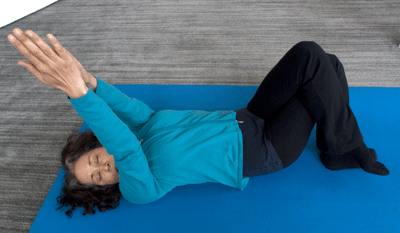Online Awareness Through Movement Classes
All our live classes are offered online:
• Click here to sign up for online classes
Classes will be offer online at the regular times.
• Monday 5:00 pm with Cliff Smyth
• Tuesday 12:00 noon with Marcia Scott
• Thursday 10:00 am with Deborah Bowes
Log in 10 minutes before class.
• Click here to purchase 10 class package for 10% discount. Your purchase can then be redeemed at class sign up using the code that is provided.
Doing Feldenkrais Lessons Online with Zoom
• Space: Find a carpeted space or use a mat: you need at least as much space as you have at the Center. Have a folded towel for a head support. Let others in your household know you will be busy – or invite them along to the class.
• Noise: You will be muted when you come into the class, but before the class starts we invite you to unmute you to say hello. Do keep muted on Zoom during the class – this reduces the chance of background noise and feedback on the internet connection.
• Camera: It is always nice for us to see you at the beginning and end of class, and it is great for us if at least some of you can angle the camera on your device to show you doing the lesson. However, this is not required. We have found that it is better to use a laptop or tablet than a phone, but if you only a phone, then of course use that.
• Take care of yourself: Go slow. Start small. Don’t do anything that causes or increases pain. Breathe. Don’t go as far as you can go. Reduce effort. Take rest. Just like live classes!
• Chat time: We will be around for a few minutes after class to share observations, answer questions, and just catch up and chat if you would like.
_____________
Note: The classes offered by Kaiser Permanente have also been suspended until April 15, and if you were enrolled in those classes you should contact Kaiser Health Education about their plans and arrangements. Kaiser classes at Mission Bay and the French Campus are also suspended.
About Awareness Through Movement
Feldenkrais Awareness Through Movement classes provide an effective, economical and enjoyable way to explore and improve your movement, deal with pain and injury and discover more about your movement and yourself.
In Awareness Through Movement lessons, the teacher verbally leads students through basic and varied movements. You lie on the floor - on your back, sides or front (depending on the lesson and the initial abilities of those in the class ) - or we may work in sitting, standing and walking.
The lessons clarify the relationship between parts of the body and the whole, the most efficient and comfortable ways of moving using the support of the skeleton and how to sense yourself as you move.
There is no demonstration, no copying of the teacher. Instead you are invited to explore the movements yourself. Classes are completely non-competitive.
In each lesson there will be elements of: scanning your bodily sensations, making movements, attending to what you feel as you more, attention to your breathing, and frequent rests.
Because we believe people learn better when there is comfort along with an appropriate challenge, you will be encouraged to move within your capacities - which will increase - and not do things that cause discomfort or pain. Whether the movements are small, gentle and slow (as they often are at first), or somewhat faster, bigger or larger, the emphasis is always on finding ways to more that require less effort and create greater ease. For learning, less strain means more gain.
The movements can be done by anyone, each to their own capability. Each person progresses from their own level and at their own rate. The teacher will choose and modify lessons based on who is coming. If you have any difficulty the teacher can help you find ways to modify the lesson.
Awareness Through Movement workshops and class series feature a number of lessons on a theme such as breathing, the movement of the spine or the use of the arms, or around particular activities, e.g. lessons for Yoga students.
Class FAQs
What level of class should you come to?
We offer classes at three levels:
for beginners, people who are in pain or dealing with injury or movement issues.
general classes: which are good for anyone without significant difficulties and those that have done some Feldenkrais before.
classes for experienced students.
What are the lessons about? There are thousands of Awareness Through Movement lessons, each one different in its focus and effect. Lessons are often organized around a functional theme or action, and cover a wide range of human functions. The learning from each lesson is generalized, so all lessons create improvements in awareness, comfort, flexibility, range of motion, attention, breathing, quality and ease of movement - which you can take into all your activities. The teacher chooses individual lessons and series of lessons based on the needs and interests of those that are coming to class.
Can I really drop in? Yes, you can really drop in to a class. While we choose the lessons to suit the people who are coming regularly and to provide a variety of lessons, there is no fixed sequence of lessons, so you can join in at any time. (If it is your first ever Awareness Through Movement class see below.) We offer drop-in classes because we recognise that life in the Bay Area makes it hard to make regular commitments! On the other hand, there is a lot of value in initially coming to class reguarly for a number of lessons so you can get in the flow and really feel the benefits.
What if I haven't taken an Awareness Through Movement class before? If you haven't done Awareness Through Movement before, of if you have any particular concerns about injury, pain, movement, or anything else, then we ask that you come 10 minutes before class so you can talk briefly with the teacher. Likewise if it is you first class with us, please allocate an extra 10 minutes after class to ask any questions, get clarifications from the teacher and so we can find out how it went for you. The first time you come to class you might also allow a extra few minutes to the estimated travel time to locate our office, and to allow for delays and to park. There is usually easy street parking.
Can I come in late? Not really. Because each lesson is a process, it is not good to miss the initial body scan and beginning movements of the lesson. This is primarily for your safety – we want to be sure that you are gently guided into the process. Each lesson is unique and each lesson is a process, so it is hard to come in the middle. Arriving late also disrupts the learning for the other students. We start and finish on time.
What should I wear? Wear comfortable clothing that you can move around in easily. Trousers are easier than skirts for privacy and easy movement. You can change in our bathroom if you need to. We try to keep the temperature in the room just right, but it can be good to wear layers to make it the most comfortable for you. Please wear socks in class.
Should I bring a mat? All mats and props are provided.
How do I pay? The exact amount ($20-) in cash is always appreciated. Checks are also OK. We keep prices low and so we don't offer payment for classes by credit card. Our frequent learner program is simple, you just fill out a card at your first class – we will keep it for you and stamp it each time you come. Come to 10 classes and the 11th is free.
How is it that these lessons can be of benefit to those who are injured and also for performers and athletes? With the Feldenkrais Method you start with what you know and can do easily. Through the process of the lessons you can find new ways of moving - discovering how you can move and feel better. By becoming aware of what is easier, more connected, stronger and more efficient, we can go beyond existing levels of performance. For some people that might be how to walk better - for others how to dance or run; for some people that might be reaching the top shelf in the kitchen, for others working on the computer or jewelry making! The effects of the Feldenkrais lessons are generalized throughout your system, people of all levels of initial ability can improve from where they started. As Moshe Feldenkrais put it, "To make the impossible, possible; the possible, easy; and the easy, elegant".
Got more questions? Please call us with any further questions: (415) 826-3680 or send us a message through the Contact page.





